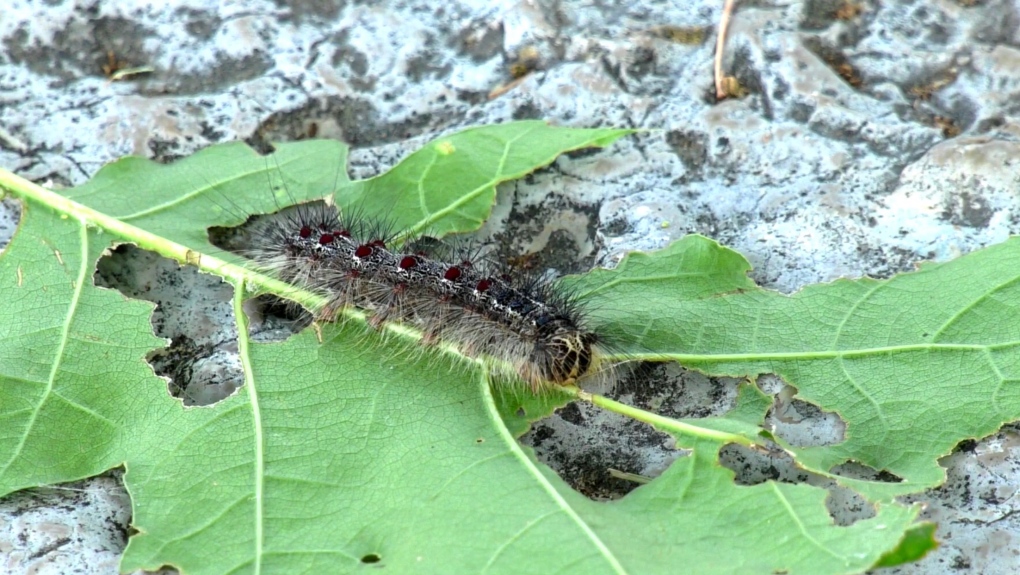Gypsy moth infestation deterring some visitors at Toronto parks
From backyards to popular parks, the gypsy moth is wreaking havoc across Ontario.
“I have changed my running routes in the park,” said Rebecca Pinkus, a frequent High Park visitor in Toronto.
“There have been some paths where after it rains the caterpillars fall and get squished and there’s caterpillar excrement.”
David Dutkiewicz, an entomology technician at the Invasive Species Centre in Sault St. Marie, said last year was the worst gypsy moth infestation Ontario has ever seen.
“This year, we’re waiting for the data to come in,” he said.
There are some remedies to help you get rid of the insect, but it depends what part of the life cycle it’s in, Dutkiewicz said.
Between August and April, the gypsy moth is in the egg stage.
Dutkiewicz recommends looking for the egg masses on trees and scraping them off with something such as a butter knife.
Next comes the caterpillar stage, arguably the worst.
“If you just stop and listen to the trees you can hear them chewing. I mean it’s just terrifying,” said Dan Riskin, CTV News’ Science and Technology Specialist.
“One of my kids was also quite terrified of the whole thing,” he said after a family visit to the Kortright Centre for Conservation in Vaughan.
 A caterpillar of the Gypsy moth is seen on a leaf in Tiny Township, Ont., on Fri., July 10, 2020. (Roger Klein/CTV News)
A caterpillar of the Gypsy moth is seen on a leaf in Tiny Township, Ont., on Fri., July 10, 2020. (Roger Klein/CTV News)
You can pick up a bio-pesticide spray called BTK at a local garden centre or hardware store, Dutkiewicz recommended.
“The caterpillars have to actually ingest the bio-pesticide basically in May in order for it to have any effect in June or whenever,” he said.
Using the spray now would almost be a waste of money, Dutkiewicz said, because there aren’t as many leaves for the insect to eat.
Wrapping a burlap band at chest-level around the tree will attract caterpillars looking for shade.
“Right now in June is the perfect time to use the burlap trap methods.”
Dutkiewicz suggests checking the burlap at lease once or twice a day, pick off the caterpillars then toss them into soapy water.
Some Ontarians have even resorted to using a vacuum or broom, which can work too.
For Pinkus, who views High Park and the allotment garden as a sanctuary, a change in the insect’s life cycle can’t come soon enough.
“The raspberry plants and my rhubarb plants have both been decimated.”
CTVNews.ca Top Stories

W5 Investigates Provinces look to Saskatchewan on how to collect millions more for victims of crime
A W5 investigation showed how convicted criminals ordered to pay restitution struggled to do so, and how just $7 million of more than $250 million had been claimed. While many provinces struggle to keep track, Saskatchewan is leading the way in making sure victims get their money.
'Tragic and sudden loss': Toronto police ID officer who died after suspected medical episode while on duty
A police officer who died after having a suspected medical episode on duty was executing a search warrant in connection with an ongoing robbery investigation in North York, Toronto police confirmed Thursday.
Who received the longest jail terms in the Gisele Pelicot rape trial?
A French court found all 51 defendants guilty on Thursday in a mass rape case including Dominique Pelicot, who repeatedly drugged his then wife, Gisele, and allowed dozens of strangers into the family home to rape her.
PM Justin Trudeau planning sizable Friday cabinet shuffle, sources say
Prime Minister Justin Trudeau is planning a sizable cabinet shuffle on Friday, sources confirm to CTV News. The long-awaited reconfiguration of Trudeau's front bench comes amid turmoil for the Liberal government after the shocking resignation of Chrystia Freeland.
Child struck by vehicle south of London has died
According to an online fundraiser organized by a family friend, the boy who was hit by a driver south of London earlier this week has died.
The Royal Family spreads holiday cheer with new Christmas cards
The Royal Family is spreading holiday cheer with newly released Christmas cards.
Love, excitement and emotional reunions as holiday travel hits its peak
Air Canada alone estimates it will move two million passengers over the holidays, with Dec. 19 to Dec. 23 being the peak period.
Manitoba man wins $40M Lotto Max jackpot
A Manitoba man has won one of the top five largest lottery jackpots in Manitoba history.
64 cases of 'norovirus-like' illness linked to raw oysters in B.C., officials say
Dozens of people have become ill after eating raw oysters in B.C. since Nov. 1, public health officials warned Thursday.


































